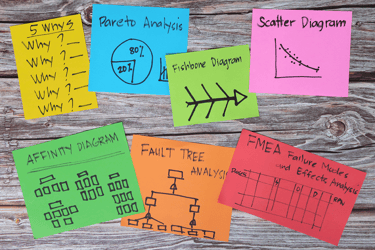The Packaging Industry's Sustainability Challenge: Why ERP Systems Are Essential for Success A straightforward guide to navigating sustainability regulations across folding carton, flexible...
What is ‘Cloud ERP’ and how can it Benefit Label Converters?
63% of companies now prefer cloud ERP over on-premise systems as they offer scalable, secure, agile, and dependable solutions that can quickly respond to market trends.
For tag and label converters, cloud ERP goes beyond basic business management - it’s a comprehensive solution designed to integrate all core business processes, from estimating and quoting to inventory management and production.
Continue reading to learn more about cloud ERP solutions, how they differ from on-premise ERPs, and the pros and cons of each for the tag and label industry.
Contents
- What is cloud ERP?
- Types of cloud ERP for label converters
- The difference between cloud and on-premise ERP
- Pros and cons of cloud ERP software
- Return on investment
- Introducing Paxis: The cloud ERP solution designed specifically for the label-converting industry
TL;DR
Cloud ERP offers tag and label converters game-changing, flexibility, scalability, and real-time access to business data. Unlike a traditional on-premise ERP, cloud-based ERP solutions are hosted externally and accessed via the internet, reducing overall time to value and dependency on IT resources. For the label-converting industry specifically, cloud ERP solutions offer key benefits such as improved quoting, inventory management, and process automation. Systems like Paxis are specifically designed for independent and growing label converters, providing tools that enhance operational efficiency and support business growth.
What is cloud ERP?
Unlike many traditional ERP solutions, cloud ERP systems are hosted on external servers and accessed via the internet, which allows for greater flexibility, lower upfront costs, and scalability.
These platforms provide real-time access and automation, enabling label converters to streamline workflows, reduce errors, and increase productivity. With features that cater to the specific needs of the label-converting industry, such as advanced quoting, material tracking, and order processing, cloud ERP solutions are transforming the way converters operate in a competitive market.
Cloud ERP offers several key concepts that are particularly relevant for the tag and label converting industry:
- Accessibility from anywhere: In the highly competitive label-converting market, access to real-time data is essential for quick decision-making. Cloud ERP allows businesses to access their systems from anywhere, whether it's from the production floor, a remote office, or even a mobile device.
- Subscription-based: The financial flexibility of cloud ERP is a major benefit for smaller and growing converters in particular. Subscription-based pricing eliminates large upfront investments and long deployments, making it easier for businesses to quickly access their ERP and scale.
- Automation and streamlining: Tag and label converters face complex production processes that need precise management. Cloud ERP systems offer automation for tasks like job scheduling, material tracking, and order processing, reducing errors and improving overall efficiency.
- Vendor-managed maintenance: Cloud ERP systems are managed by the SaaS provider, meaning that updates, maintenance, and security patches are handled externally. This reduces the need for a dedicated IT team, allowing tag and label converters to focus on core business operations instead of managing software infrastructure.
Types of cloud ERP for label converters
Several cloud ERP models suit different operational needs within the label-converting industry:
| ERP Type: | Description: |
| Multi-Tenant SaaS ERP | In this model, multiple businesses share the same instance of ERP software, reducing costs through shared resources. For label converters looking for a cost-effective solution with less need for customization, multi-tenant SaaS ERP is an ideal option. |
| Single-Tenant SaaS ERP | For converters needing more customization or stricter data security, single-tenant SaaS ERP offers a dedicated instance of the ERP software, providing more control while still benefiting from cloud infrastructure. |
| Private Cloud ERP | For label converters handling highly sensitive data or operating under strict regulatory requirements, private cloud ERP provides an extra layer of control and security. It’s hosted on dedicated servers, offering enhanced privacy at a higher cost. |
| Hybrid ERP | Some tag and label converters may prefer to keep certain operations on-premise, while leveraging cloud solutions for others. Hybrid ERP offers the flexibility to manage part of the system in-house while using cloud functionality for processes like inventory management or customer relations. |
The difference between cloud and on-premise ERP
In a survey of IT decision-makers, 53% said Cloud ERP was an investment priority, in addition to CRM - ComputerWeekly.
For label converters, choosing between cloud ERP and on-premise ERP depends on the specific needs of your business:
- Cloud ERP: Hosted off-site and managed by the ERP provider, cloud ERP systems offer lower upfront costs, scalability, and accessibility. These systems allow label converters to adapt quickly to market changes and customer demands.
- On-premise ERP: On-premise ERP systems are hosted on your servers and managed by your IT team. While this provides more control, it comes with higher costs and requires dedicated IT staff for maintenance and updates. On-premise ERP systems are typically less agile, making it harder for businesses to scale quickly or adapt to market changes.
Due to lower implementation costs and no requirement for an IT team, Cloud ERP systems are particularly beneficial for independent and growing label converters .
Pros and cons of cloud ERP software
| Pros | Cons |
| Cost savings: Cloud ERP eliminates the need for expensive hardware, making it a cost-effective solution for label converters looking to manage their budget efficiently. | Data control: Some label converters may have concerns about data security and privacy when their systems are hosted off-site. While cloud ERP providers implement strict security measures, it’s important for businesses to assess their own compliance needs. |
| Scalability: As label converters grow, cloud ERP can easily accommodate increased demand, new product lines, or additional users, without requiring significant infrastructure investments. | Ongoing subscription costs: Although cloud ERP reduces upfront costs, businesses need to factor in the continuous subscription fees. Over time, these costs can add up, especially as the business grows. |
| Real-time insights: Cloud ERP provides real-time access to production, inventory, and financial data, allowing converters to make quick, data-driven decisions. | Customization limitations: Multi-tenant cloud ERP systems typically offer fewer customization options compared to on-premise ERP systems, which may be a drawback for label converters with unique operational requirements. |
| Automation of core processes: Cloud ERP automates essential tasks such as order management, production scheduling, and quoting, reducing errors and transforming operational efficiency. |
Return on investment
For many label converters, the value of a cloud-based ERP system becomes clear almost immediately. With pre-configured tools designed specifically for label businesses, systems like Paxis can be quickly adopted with minimal setup. The reduction in manual errors, streamlined operations, and faster decision-making lead to operational efficiency from day one. The ability to scale without significant upfront investment or complex IT infrastructure allows converters to start seeing a return on investment within weeks, as the time and cost savings rapidly outpace the low cost of implementation and ongoing subscription.
Key factors that contribute to a positive ROI include:
- Reduced material waste due to more accurate inventory tracking
- Lower labor costs as a result of automation
- Fewer costly reprints from improved quoting and estimating accuracy
- Faster production cycles leading to higher customer satisfaction and increased repeat business
- Scalability that allows businesses to grow without investing in additional IT infrastructure
While the ongoing subscription fees may seem like a recurring cost, the long-term value that cloud ERP brings to a label-converting business far outweighs this. The ability to remain agile in an evolving market, handle increased complexity as customer demands change, and continuously optimize operations ensures that label converters can grow sustainably and profitably.
Introducing Paxis: The cloud ERP solution designed specifically for the label-converting industry
For independent and growing label converters, Paxis offers a specialized cloud ERP solution tailored to meet the unique needs of the industry. Unlike generic ERP systems, Paxis was designed with the label-converting industry in mind, providing tools that optimize both digital and analog label production.
Here’s how Paxis can revolutionize your label-converting business:
- Advanced quoting and estimating: For small label converters, who spend too much time manually calculating estimates, Paxis simplifies the process by factoring in materials, production time, and machine selection. This allows them to generate precise and competitive quotes in minutes, significantly reducing the risk of human error and costly reprints.
- Inventory optimization: Managing inventory is challenging. Paxis helps streamline this process by giving converters full control over their inventory, reducing waste, maintaining optimal levels, and ultimately improving profitability without complex manual tracking.
- Real-time operational insights: Small label converters often find it difficult to keep track of business performance and make data-driven decisions. Paxis offers real-time visibility into all aspects of operations - from production efficiency to financial performance - helping to make faster, more informed decisions that support growth without increasing complexity.
- Rapid deployment and scalability: As a cloud-native solution, Paxis can be quickly deployed with minimal upfront investment. Its user-friendly interface requires no technical expertise, allowing businesses to focus on growth rather than learning complex systems. As companies expand, Paxis scales seamlessly to accommodate new users, products, or locations, ensuring it remains a sustainable solution as business needs evolve.
For tag and label converters looking to streamline their operations, reduce costs, and scale efficiently, Paxis offers a powerful, cloud-based solution that addresses the specific challenges of the industry. With Paxis, you get the tools you need to stay competitive, agile, and ready to meet the demands of today’s fast-paced market.





